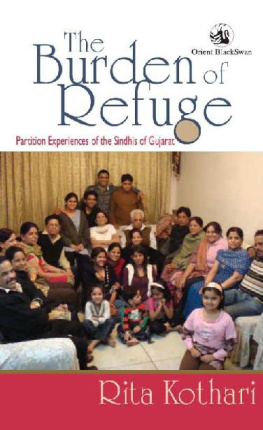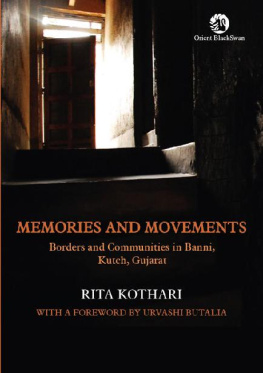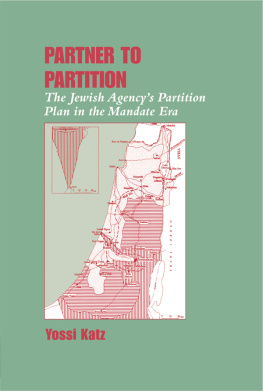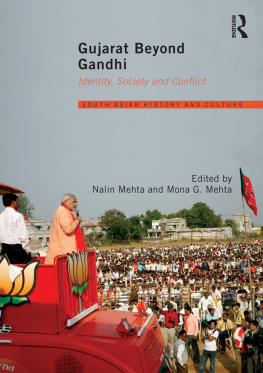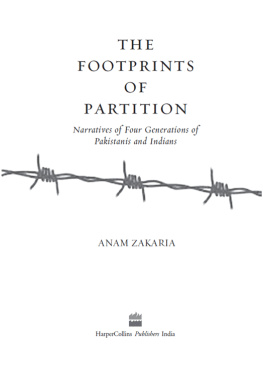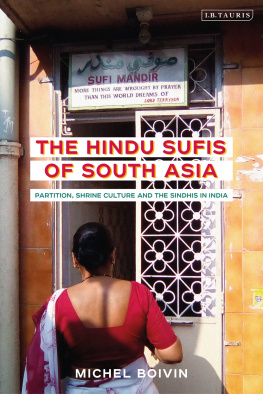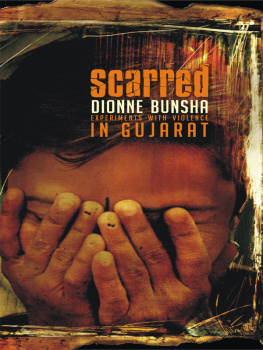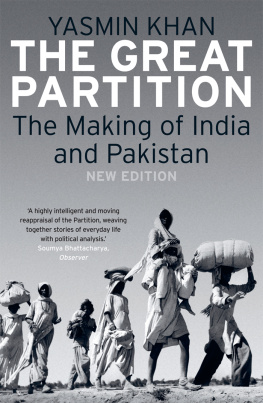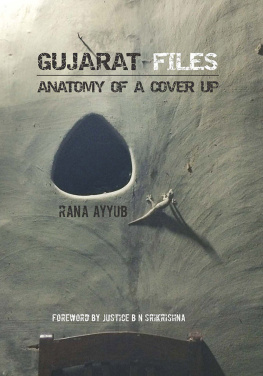THE BURDEN OF REFUGE
For our entire range of books please use search strings Orient BlackSwan, Universities Press India and Permanent Black in store.
The Burden Of Refuge
T HE S INDHI H INDUS OF G UJARAT
Rita Kothari
THE BURDEN OF REFUGE
Orient Blackswan Private Limited
Registered Office
3-6-752 Himayatnagar, Hyderabad 500 029 (A.P.), INDIA
e-mail:
Other Offices
Bengaluru, Bhopal, Chennai, Guwahati,
Hyderabad, Jaipur, Kolkata, Lucknow, Mumbai,
New Delhi, Noida, Patna, Vijayawada
Orient Blackswan Pvt. Ltd. 2007
First Published 2007
eISBN 978-93-5287-505-4
e-edition: First Published 2018
ePUB Conversion: .
All rights reserved. No part of this publication may be reproduced, distributed, or transmitted in any form or by any means, including photocopying, recording, or other electronic or mechanical methods, without the prior written permission of the publisher, except in the case of brief quotations embodied in critical reviews and certain other noncommercial uses permitted by copyright law. For permission requests write to the publisher.
For
my father
Laxmandas Makhija
and
my daughter
Shamini Kothari
Contents
Acknowledgements
The origins of this book lie in personal experience. Abhijit Kothari made me see the academic validity of this personal experience. I am most grateful to him.
Many friends and colleagues have contributed to this book: Sarvar Sherry Chand for her intellectual and emotional support, Achyut Yagnik for taking me to the first conference where the Sindhi experience of Partition was being discussed and his subsequent inputs, Nandita Mimi Chowdhury for being the first person from the publishing world to acknowledge the validity of this project, Prof. Jan Bremen and Prof. Ghanshyam Shah for their deeply moving interest in the project, Prof. Vai Ramanathan for sending me books and dissertations from the U.S., Lata Parwani for sharing her unpublished work and Paul D Souza S.J. for patiently waiting for me at airports and outside visa offices in Delhi, Susan George for editorial expertise and more. I am grateful to all of them.
Several institutions and people associated with them lent their valuable support: the Institute of Sindhology, Adipur, Kutch (Sahib Bijani and Lakshmi Khilani), Gujarat State Archives (Dinesh Bhatt), Fr. Cedric Prakash at PRASHANT, Ahmedabad, Karamat Ali and B.M. Kutty at PILER, Karachi, Social Science Regional Council (SSRC) and the University Grants Commission. I thank all of them.
My Karachi friends Saghir Shaikh, Salam Dharejo, Brij Jesrani, Khalique Jonejo, Yousif Hyder Shaikh and Shoukat Hossain Shoro opened up homes for me and extended to me warmth only Sindh can offer.
I took generous help from several people without whom my fieldwork would not have been possibleDr. Girish Kazi and Thakur Motwani (Surat), Jeetu Ramnani (Kalol), Prem Goplani (Bhavnagar), Makhija (Ahmedabad), Murli (Vadodara), Jayant Relwani (Rajkot). Vidya Tewani helped me with library and human resources. Thanks, Vidya.
I thank Prof. Radha Kumar for her critical evaluation of this book ,and the management at St. Xaviers College, Ahmedabad for their support.
I have enjoyed working with Orient Longman and especially wish to thank the editors Hemlata Shankar and R. Sivapriya.
My gratitude to my families Makhijas and Kotharis is difficult to articulate. Should I just say, thank you?
Finally, thanks to all the proud and dignified Partition survivors from Sindh to whom this book owes its existence.
Rita Kothari
August 2006
Ahmedabad
Preface
At the turn of the previous century, my grandfather who lived in Shikarpur, Sindh, moved like a temporary migrant from Sindh to Bukhara and back. Shikarpur was the heart of commercial activity in Sindh, and his foray into Central Asia was part of a financial network which developed in the second half of the eighteenth century. This surge of IndoCentral Asian trade lasted until the time of the Russian Revolution. In 1947, my father moved from Sindh to India and his movement was part of a historical exodus of Partition migrants from Sindh. In the 1960s, my cousin moved from Bombay to Hong Kong and like many other Sindhis, made a niche for himself in the electronics market until Hong Kong ceased to be a British possession and joined China. All three men represent different diasporic moments and also voluntary and some not-so-voluntary contexts of crossing borders and the consequent separation from a real and/or imaginary homeland (Braziel and Mannur 2003, 1). The three moments also reflect the frequent subjection of the Sindhi community to larger historic forces. For the purposes of this book, my concern lies in the movement my father and one million odd Hindus of Sindh madethe contexts that made them feel that they must leave their land, and the consequences this has had on them and the two successive generations that grew up in a divided India.
In the academic and literary discourse on Partition, it is a fact little documented and discussed that like the Punjabis and Bengalis, the Indian Sindhis also had a homeland in what is now Pakistan, and that there was a mass exodus of over 700,000 Sindhi Hindus from the province of Sindh during 1947. The Sindhis drew little attention from the state and subsequently, from Partition Studies, because they had arrived safely. The Sindhi story of Partition does not live up to the archetypal images of blood and gore. There were few instances of violence in Sindh, and many cases of loot and hooliganism, but these occurred some months after Partition. They are considered, by both the Hindus and the Muslims of Sindh, as results of the influx of Indian refugees into Sindh, and not as reflections of communal tensions within the province. This changes the contours of the Sindhi experience of Partition, which was perhaps more traumatic in its moment of resettlement in India, than in the departure from Sindh.
It is an equally unacknowledged fact that there was no Indian part of Sindh that the Sindhis were coming to. Sindh, in its entirety, went to Pakistan, and a majority of the Hindus who constituted its religious minority, fled from the province. Thus one of the richest, globally diasporic communities arrived in India as stateless and penniless immigrants and restarted life amidst the resentment and reluctance extended by host communities. The religious minority of Sindh was now the linguistic minority of India, accompanied by a considerable diminution in their social standing. In fact, their Hinduness, the chief reason for their migration, was also put to question in states like Gujarat and Rajasthan, and in parts of Uttar Pradesh. As a community that ate meat, eschewed traditional Hindu practices such as untouchability, and hailed from Pakistan, the Sindhis were considered Muslim-like and untouchable in staunch vegetarian states such as Gujarat and Rajasthan.
The over-pragmatic Sindhi did not indulge in nostalgia for the homeland for he became the petty and pushy trader who undercut profit and thus re-established himself once again as one of the most successful businessmen. The communitys collective forgetting enabled individuals to become model migrants who got on with life and were soon established and affluent, almost as if Partition had never happened. Save a handful of Sindhi writers (who speak largely to their own tribe because nobody else reads them) and the surviving members of the migrant generation, a large majority of the Sindhis in India hardly ever think of themselves as a post-Partition community. The migrant generations seldom told stories about their past to the younger generations, or perhaps, the latter had no desire to hear them. The shared codes of language, legends and community networks also became difficult to sustain because the Sindhis have been dispersed across many states in India. Their inability to re-create a Sindhi history and culture in a divided India contrasts with their phenomenal economic success, making them textbook examples of migrant adjustment.



